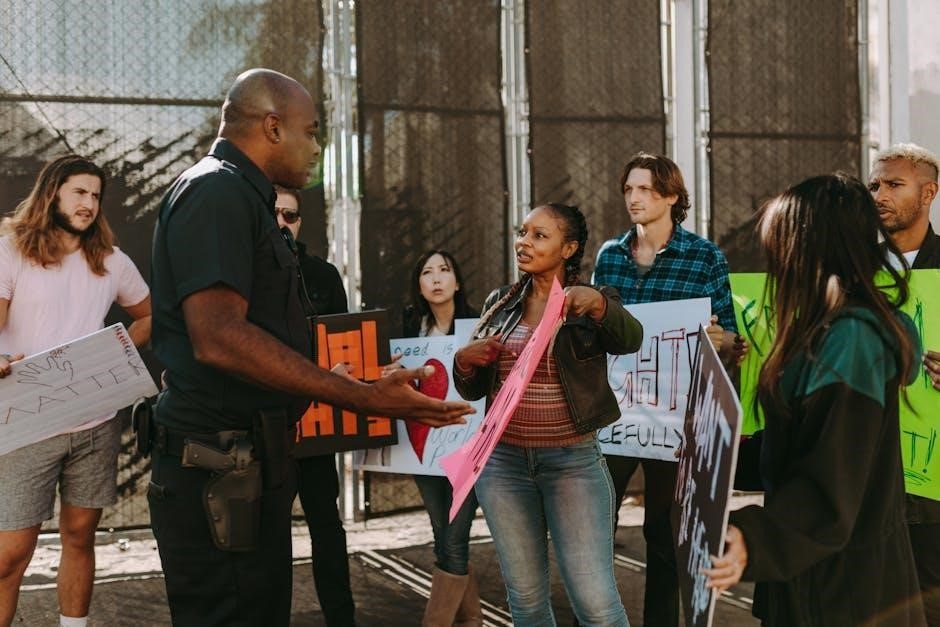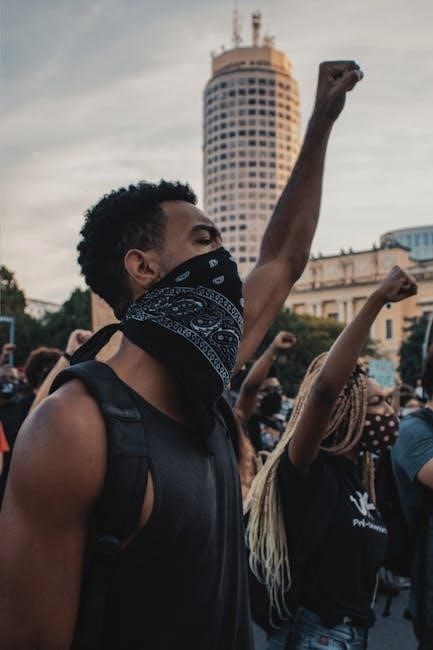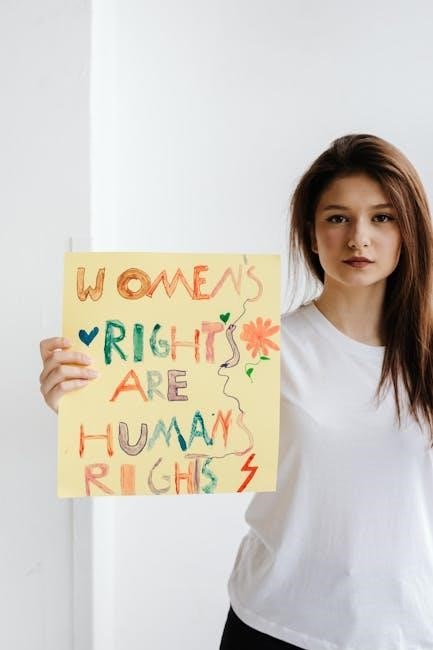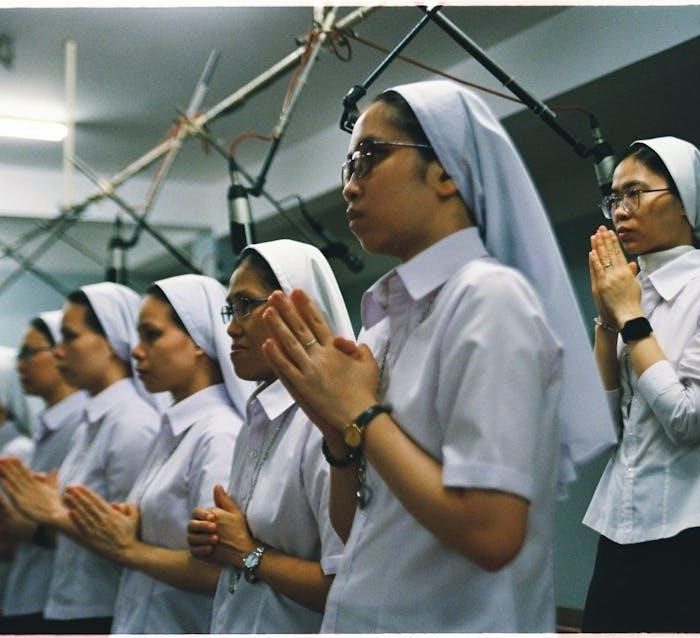Readings on diversity and social justice offer essential insights into understanding systemic inequalities and fostering inclusive environments․ They explore historical contexts‚ cultural competencies‚ and strategies for equity‚ empowering individuals to advocate for justice and equality in education and society․
Understanding the Importance of Diversity and Social Justice in Education
Diversity and social justice in education are crucial for creating inclusive learning environments that address systemic inequalities․ Educators play a vital role in promoting equity by acknowledging the impact of race‚ gender‚ and bias․ Readings emphasize cultural competency‚ fostering empathy‚ and preparing students for a global society․ By integrating diverse perspectives‚ educational institutions empower individuals to challenge stereotypes and advocate for justice․ These resources provide strategies for educators to create safe‚ equitable spaces‚ ensuring all students thrive regardless of their background or identity․
Overview of Key Concepts and Terminology
Key concepts in diversity and social justice include equity‚ inclusion‚ and cultural competency․ Equity ensures fair access to opportunities‚ while inclusion involves creating environments where all individuals feel valued․ Cultural competency refers to understanding and respecting diverse cultures․ Terminology such as systemic bias‚ intersectionality‚ and privilege are essential for discussing these issues․ These concepts are explored in readings that provide frameworks for addressing social justice in education and beyond‚ helping individuals navigate complex discussions around identity and inequality․

The Role of Education in Promoting Diversity and Inclusion
Educational institutions play a vital role in fostering diversity and inclusion by creating inclusive curricula‚ promoting dialogue‚ and addressing biases‚ ultimately preparing students to advocate for social justice․
How Educational Institutions Foster Social Justice
Educational institutions foster social justice by implementing inclusive policies‚ promoting diverse curricula‚ and creating safe spaces for dialogue․ They encourage critical thinking about systemic inequalities and empower students to address social issues․ Through workshops‚ training‚ and community partnerships‚ these institutions cultivate empathy and advocacy‚ preparing future leaders to champion equity and justice in society․ By integrating social justice into both academic and extracurricular activities‚ they nurture environments where diversity is valued and inclusivity is prioritized․
The Impact of Bias‚ Race‚ and Gender in Educational Settings
Bias‚ race‚ and gender significantly influence educational experiences‚ shaping opportunities and outcomes for students․ Implicit biases can affect teacher expectations and student assessments‚ perpetuating inequalities․ Racial disparities in discipline and resource access further marginalize certain groups‚ while gender stereotypes limit academic and career choices․ Addressing these issues requires conscious efforts to create inclusive environments‚ ensuring equitable access to resources and opportunities for all students‚ regardless of their background or identity․

Historical Context of Social Justice Movements
Global social movements‚ such as those highlighted in “Global Social Movements” by R․ Cohen and S․M․ Rai‚ have historically shaped the fight for equality and justice‚ influencing education and societal change․
Global Social Movements and Their Influence on Diversity
Global social movements have played a pivotal role in shaping diversity and inclusion efforts worldwide․ Resources like Global Social Movements by R․ Cohen and S․M․ Rai highlight how these movements address systemic inequalities and advocate for justice․ They emphasize the importance of cultural competency and equity‚ influencing educational curricula and societal change․ For instance‚ lesson plans incorporating works like I‚ Too‚ Am America by Langston Hughes introduce students to social justice themes‚ fostering empathy and understanding․ These movements and materials collectively inspire global advocacy‚ promoting inclusive environments across cultures and regions․
Major Milestones in the Fight for Equality and Justice
Key milestones in the fight for equality include the Civil Rights Movement‚ abolition of apartheid‚ and women’s suffrage․ These movements dismantled systemic barriers‚ inspiring global reforms․ Readings highlight landmark legislation‚ such as the U․S․ Civil Rights Act‚ and the impact of grassroots activism․ They also explore modern advancements‚ like marriage equality and anti-discrimination laws․ These milestones underscore the power of collective action and education in advancing justice‚ as detailed in resources like Global Social Movements and Promoting Diversity and Social Justice․

Diversity‚ Equity‚ and Inclusion in Modern Society
Modern society emphasizes fostering inclusive environments where diversity is celebrated‚ and equity is prioritized․ Readings highlight strategies to address biases and promote cultural competency in education and workplaces․
Defining Diversity‚ Equity‚ and Inclusion
Diversity refers to the presence of differences within a setting‚ such as race‚ gender‚ and culture․ Equity ensures fair access to opportunities‚ addressing systemic disparities․ Inclusion involves creating environments where all individuals feel valued and empowered to participate fully․ These concepts are interconnected and essential for fostering social justice․ Readings on diversity and social justice provide frameworks to understand and implement these principles effectively in education and society․
Practical Strategies for Promoting Inclusivity
Strategies for inclusivity include culturally responsive teaching‚ bias training‚ and creating safe spaces for dialogue․ Educators can integrate diverse texts and perspectives into curricula‚ fostering empathy and understanding․ Policies should address systemic barriers‚ ensuring equitable access to resources․ Active listening and allyship are crucial in amplifying marginalized voices․ These approaches‚ supported by readings on diversity and social justice‚ help build inclusive environments where everyone thrives․
Global Perspectives on Diversity and Social Justice
Global perspectives highlight diverse approaches to social justice‚ emphasizing cultural competency and case studies from the Global South to address inequality and promote inclusivity worldwide․
Cultural Competency and Its Role in Social Justice
Cultural competency is a critical skill in advancing social justice‚ enabling individuals to understand and respect diverse perspectives․ Readings emphasize its importance in breaking down stereotypes‚ fostering inclusive environments‚ and addressing systemic inequalities․ By integrating cultural awareness into education and advocacy‚ individuals can better navigate cross-cultural interactions and promote equity․ These resources highlight practical strategies for developing cultural competency‚ ensuring that social justice efforts are both effective and respectful of all communities involved․
Case Studies from the Global South
Case studies from the Global South provide invaluable insights into social justice efforts‚ highlighting unique challenges and successes in diverse cultural contexts․ These narratives often focus on combating systemic inequalities‚ promoting inclusivity‚ and empowering marginalized communities․ Readings explore initiatives such as grassroots movements in Africa‚ indigenous rights in Latin America‚ and gender equity programs in Asia․ By examining these examples‚ learners gain a deeper understanding of global social justice strategies and their adaptability to local conditions‚ fostering a more nuanced approach to diversity and inclusion worldwide․

Literature and Resources for Social Justice Education
Essential readings include texts like Global Social Movements and The International Journal of Information‚ Diversity‚ & Inclusion‚ offering insights into diversity and justice through prominent authors and case studies․
Recommended Readings for Understanding Diversity and Justice
Essential texts include Global Social Movements and The International Journal of Information‚ Diversity‚ & Inclusion‚ which provide insights into diversity and justice․ Influential authors explore systemic inequalities‚ cultural competencies‚ and strategies for equity․ Works like I‚ Too‚ Am America by Langston Hughes highlight social justice themes through literature․ These readings offer historical context‚ practical applications‚ and modern perspectives‚ empowering educators and advocates to address bias‚ race‚ and gender in educational settings and society at large․
The Role of Literature in Shaping Social Justice Conversations
Literature plays a vital role in sparking dialogue on social justice by reflecting diverse experiences and challenging societal norms․ Works like I‚ Too‚ Am America by Langston Hughes highlight systemic inequalities and inspire reflection․ Through storytelling‚ literature humanizes marginalized voices‚ fostering empathy and understanding․ Educators use such texts to facilitate discussions on race‚ gender‚ and bias‚ empowering students to engage with justice issues critically․ Literature serves as both a mirror to society and a catalyst for change‚ enriching conversations and encouraging advocacy for equity and inclusion․
Practicing Social Justice in Everyday Life
Practicing social justice involves addressing biases‚ advocating for equality‚ and promoting inclusivity in daily interactions․ Education‚ workplace policies‚ and community engagement are key areas of focus․
Actions Individuals Can Take to Promote Equality
Individuals can promote equality by educating themselves on diversity issues‚ addressing personal biases‚ and advocating for inclusive policies․ Engaging in respectful conversations‚ supporting marginalized communities‚ and challenging systemic inequalities are essential steps․ Using privilege to amplify underrepresented voices and participating in social justice initiatives can foster meaningful change․ Encouraging diversity in workplaces and schools‚ as well as promoting cultural understanding‚ are practical actions that contribute to a more equitable society․ Continuous learning and active advocacy are crucial for sustaining progress toward social justice․
Training and Resources for Advocates of Social Justice
Advocates of social justice can access various training programs and resources to deepen their understanding and effectiveness․ Workshops‚ online modules‚ and literature provide practical tools for addressing bias‚ promoting equity‚ and fostering inclusion․ Resources like diversity toolkits and community engagement guides empower individuals to take actionable steps․ Collaborative efforts with organizations specializing in social justice further enhance learning opportunities‚ ensuring advocates are well-equipped to drive meaningful change and support marginalized communities effectively․
Challenges and Opportunities for the Future
Addressing systemic barriers and leveraging innovative approaches will shape the future of diversity and social justice‚ ensuring equitable progress and inclusive solutions for all communities globally․
Addressing Systemic Barriers to Social Justice
Systemic barriers‚ such as institutional racism and gender disparities‚ hinder social justice efforts․ Addressing these requires policy reforms‚ education‚ and community engagement to dismantle oppressive structures․ Readings highlight strategies like bias training‚ equitable resource distribution‚ and legal advocacy to create inclusive systems․ Empowering marginalized voices and fostering cultural competency are crucial steps․ By integrating diverse perspectives‚ society can challenge and dismantle systemic inequities‚ promoting fairness and equality for all․ These efforts ensure that social justice initiatives are sustainable and transformative‚ leading to a more just and inclusive world․
Innovative Approaches to Promoting Diversity and Inclusion
Innovative strategies‚ such as inclusive curricula and community engagement‚ are transforming diversity efforts․ Digital platforms and interactive workshops foster dialogue‚ while storytelling and cultural exchanges enhance empathy․ Bias training and micro-credential programs empower individuals to advocate for equity․ These approaches not only challenge stereotypes but also create spaces for marginalized voices to thrive․ By integrating technology and creativity‚ educators and organizations can develop sustainable‚ inclusive environments that celebrate diversity and promote social justice effectively․ Such methods ensure lasting change and equitable opportunities for all individuals․
Readings on diversity and social justice emphasize the importance of empathy‚ understanding‚ and advocacy․ They guide efforts toward equity‚ fostering inclusive environments and inspiring collective action for lasting change․
Summarizing the Path Forward for Diversity and Social Justice
Advancing diversity and social justice requires continuous education‚ cultural competency‚ and advocacy․ Readings highlight the importance of inclusive policies and equitable practices‚ urging individuals to challenge biases and promote equality․ By fostering empathy and understanding‚ society can address systemic inequalities and create opportunities for all․ Literature serves as a powerful tool to inspire change‚ encouraging collective action and fostering a culture of justice and inclusion․ The path forward lies in sustained efforts to educate‚ reflect‚ and act․



